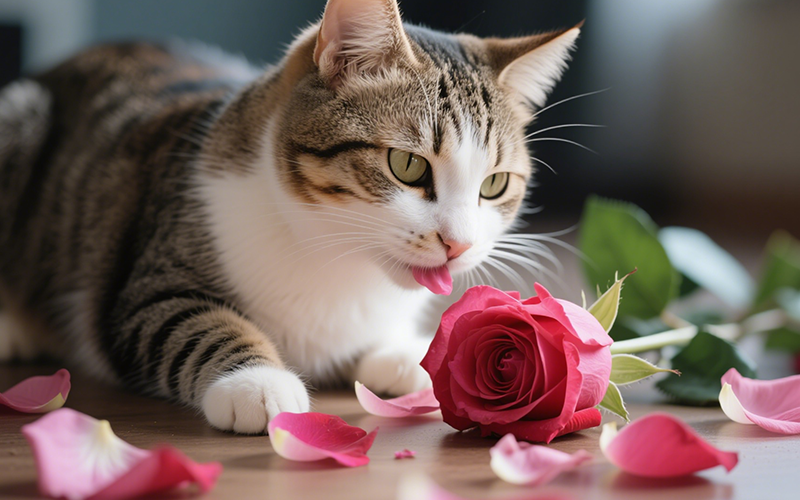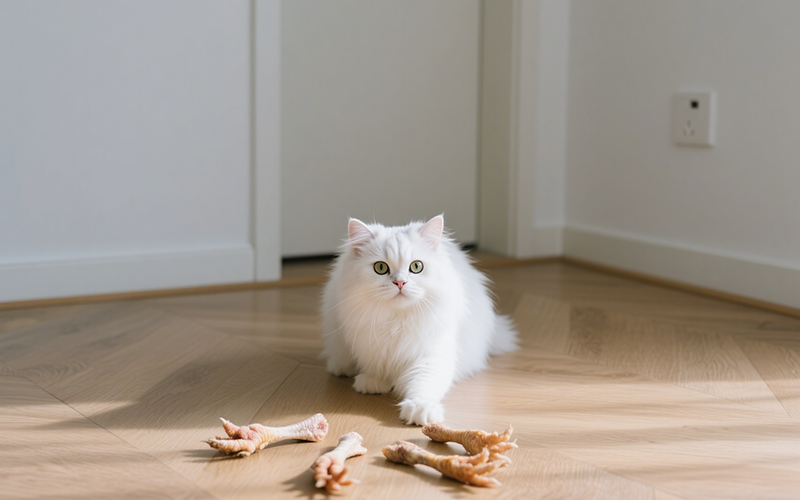Can Cats Eat Rose Petals? What You Need to Know About Roses and Cats
- 8 Apr 2025 16:00
Roses are beautiful flowers commonly found in gardens and used in bouquets, but can cats eat rose petals? While roses themselves are not generally toxic to cats, there are important things to consider before letting your feline friend nibble on rose petals. Let’s take a look at whether it's safe for cats to eat rose petals and what precautions you should take.

Are Rose Petals Safe for Cats?
Rose petals themselves are not toxic to cats, but they don’t offer much nutritional value either. While the petals might seem like a natural treat for your cat, there are some important factors to keep in mind:
Potential Irritation: Even though rose petals are not toxic, they may cause mild digestive upset if ingested. Cats might experience vomiting, diarrhea, or mild stomach discomfort from eating too many rose petals. It's always best to monitor your cat closely if they eat any flowers or plants.
Pesticides and Chemicals: One of the main concerns with roses is the use of pesticides and chemical fertilizers on rose plants. If the rose petals have been treated with these substances, they could be harmful to your cat if consumed. Always make sure that any flowers or plants your cat has access to are free from harmful chemicals.
Thorns: While rose petals may be soft and harmless, rose stems and thorns can pose a serious risk. If your cat attempts to eat or chew on the stem, they could injure their mouth, throat, or digestive tract. Thorn injuries can be painful and may lead to infection, so it’s important to remove any thorns before offering rose petals to your cat.
Other Parts of the Rose: While rose petals are relatively safe, the other parts of the rose, such as the leaves and stems, are more likely to cause harm if ingested. These parts of the plant contain compounds that may be irritating to your cat’s digestive system and could cause more severe symptoms like vomiting or diarrhea.
Benefits of Rose Petals for Cats
There are no significant nutritional benefits to rose petals for cats. However, some people use rose petals for their aesthetic appeal or as part of a natural remedy for minor health issues. For example, some believe that rose petals can act as a mild anti-inflammatory, but this is more relevant in human health and not for cats.
Alternatives to Rose Petals for Cats
If you're looking for safe, natural treats for your cat, there are plenty of options that are both safe and beneficial:
Catnip:Catnip is a popular plant that cats love. It has a safe, enjoyable effect on cats, promoting playful behavior and relaxation. You can grow catnip in your garden or buy it in dried form.
Cat Grass:Cat grass (often made from wheat or oat grass) is another safe and nutritious plant option for cats. It helps with digestion and provides some fiber, which can help prevent hairballs.
Edible Flowers: Certain flowers, like dandelions, calendula, and violets, are safe for cats and may be a fun, edible treat. Always make sure to research the safety of any flower before offering it to your cat.
Commercial Cat Treats: There are many herbal-based cat treats available that are designed to provide health benefits without the risks of potentially harmful plants.
What to Do if Your Cat Eats Rose Petals
If your cat eats a small amount of rose petals, there is generally no cause for concern. However, if they consume a larger amount of petals or other parts of the rose plant (such as the leaves or stems), it’s important to monitor for any signs of digestive upset. Here’s what to watch for:
Vomiting or Diarrhea: If your cat shows signs of vomiting or diarrhea, it could be a result of the rose petals irritating their stomach. Keep your cat hydrated and allow their digestive system to recover.
Lethargy or Loss of Appetite: If your cat seems lethargic, has a decreased appetite, or is acting unusually, it may be a sign of an adverse reaction. In such cases, it’s best to contact a veterinarian for advice.
Thorn Injury: If your cat chews on a rose stem, be sure to check their mouth and gums for any injuries from the thorns. If you notice bleeding or swelling, it may require treatment from a vet.
If you’re unsure about what your cat has eaten or if they’re showing concerning symptoms, you can consult PettureX, a 24-hour online consultation service that provides quick answers and professional advice on pet health concerns.
Conclusion
So, can cats eat rose petals? While rose petals are not toxic, it’s best to be cautious and only allow your cat to nibble on them in moderation. Avoid feeding other parts of the rose plant, especially the stems and leaves, as they can be more harmful. Always ensure the roses are free of chemicals, and remove any thorns to prevent injury. If your cat does eat rose petals and shows signs of digestive upset, keep an eye on them and contact a veterinarian if needed.
For more guidance on pet health, don’t hesitate to consult PettureX for quick, reliable advice! 🌹🐱💚
Related

Can Cats Eat Egg Yolk Raw? A Vet's In-Depth Guide to Feline Nutrition & Safety
- 10 Jun 2025
Can Cats Eat Dog Kibble? Unpacking the Nutritional Mismatch!
- 29 May 2025
Can Cats Eat Deli Turkey? Slicing Through the Facts for Your Feline!
- 29 May 2025
Can Cats Eat Deer Meat? Exploring Venison for Your Feline!
- 28 May 2025
Can Cats Eat Corned Beef? Unpacking This Salty Human Delicacy!
- 28 May 2025
Can Cats Eat Cooked Rice? The Grain Truth for Your Feline Friend!
- 27 May 2025
Can Cats Eat Cornbread? A Crumb of Truth for Curious Cat Owners!
- 27 May 2025
Can Cats Eat Cooked Meat? Sizzling Facts for Your Feline's Feast!
- 26 May 2025
Can Cats Eat Chili? Spicing Up the Truth About This Human Dish!
- 26 May 2025
Can Cats Eat Chicken Feet? A Paw-sitive or Negative Treat?
- 24 May 2025
